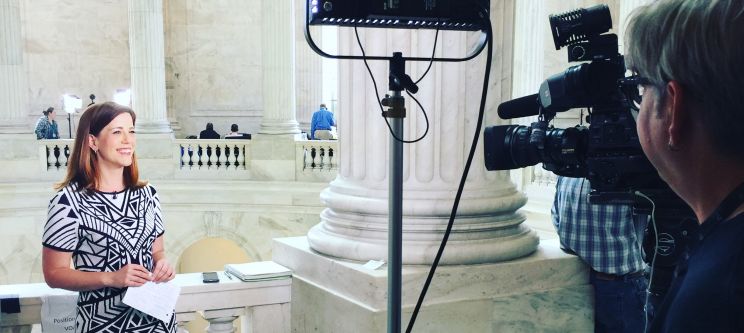Katherine Gypson Political Meaning Matters

For Katherine Gypson ’05, covering Donald Trump’s presidential campaign and the current U.S. Congress for Voice of America has been an abject lesson in the meaning of words, something her Marlboro experience made her ideally equipped to cope with.
“I’ve always loved history and the personalities and moral questions that come into play in politics,” says Katherine Gypson, who completed a Plan of Concentration in writing and history focusing on U.S. foreign policy in Afghanistan. She earned a master’s degree in journalism and public policy from American University in 2008, and started producing nonpartisan television programs for America Abroad Media that same year.
“I covered the last round of presidential elections as a documentary producer, working behind the scenes setting up shoots, managing camera crews and budgets, researching and drafting questions for my reporters—all of the work except putting myself out there on camera,” says Katherine. “On the final night of the 2012 Democratic National Convention I was on the convention floor during President Obama’s acceptance speech and I finally admitted to myself that I wanted to be a reporter.”
Katherine earned the opportunity to be an on-camera reporter when she moved to Voice of America the next year. But she didn’t start covering the “Trump beat” until she traveled to Tennessee in the spring of 2016 to report on a white supremacist rally, and talked to some of the locals about their vote for Trump and their thoughts on the rally.
“The complexity of that story, the unanswered questions at the heart of it, made me want to stick with reporting on Trump voters to find out more about this moment of change in the United States,” she says.
Katherine loves everything about being VOA’s congressional correspondent, although the job is all-consuming and the industry is constantly in flux. In the past year her profession has been under fire as dishonest, corrupt, and the “enemy of the people,” and she feels she is constantly defending her job. And yet she says “It’s a great life.”
“I’m paid to learn new things, to meet people and ask them questions about their lives and the things that are closest to them,” she says. “I travel, read, write, learn—it’s a life of constant questioning that lets me work around smart, sarcastic people who love coffee as much as I do.”
Of all the Marlboro experiences and skills that she applies to her current position, Katherine is most indebted to her writing professors—Laura Stevenson and John Sheehy in particular.
She says, “They pushed me to embrace complexity in my writing and thinking, to not be afraid of it and see it as an opportunity to make my work better and ask harder questions. There are times when I’m crashing on a story and I remind myself, ‘clear writing, clear thinking.’ I have a mass of information coming at me every day, and so much of our political debate now is about the meaning of words and whether or not they matter. The Marlboro approach helps me take a step back to define the story.”
Katherine loves the challenge of live television—the intensity of conveying a story in a few minutes. “Each story teaches me a little bit more about how to approach the next story,” she says. “And I definitely want to cover another presidential election.”
See some of the recent VOA articles and videos Katherine has produced or her special story about the white supremacist rally.

